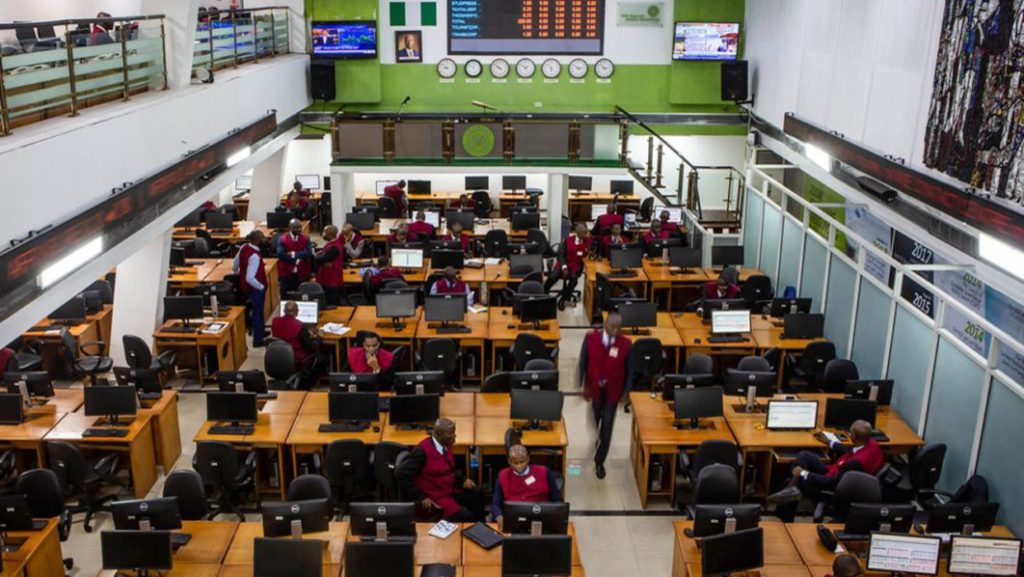The Nigerian equity market experienced a mixed performance during a holiday-shortened trading week culminating on April 21, 2025. While the overall market trend was downwards, with a loss of N207 billion in market capitalization, certain sectors and individual stocks showed resilience and even posted gains. The Easter holidays, impacting trading days, played a significant role in the reduced market activity and overall performance. The benchmark All-Share Index dipped by 0.32%, reflecting a cautious investor sentiment influenced by a combination of corporate earnings reports and dividend announcements. This decline, however, was partially offset by a late-week rally that recouped N239 billion in market capitalization, hinting at underlying positive sentiment despite the overall negative trend.
Trading activity noticeably slowed down during the four-day week. The total traded volume and value decreased compared to the preceding week, with investors exchanging 1.525 billion shares worth N43.006 billion. This reduced activity is directly attributable to the shorter trading period caused by the public holidays. Despite this slowdown, the financial services sector maintained its dominance, accounting for a significant portion of the total traded volume and value. This underscores the continued importance of the financial sector within the Nigerian economy and its influence on the stock market.
Sectoral performance painted a diversified picture, with some sectors demonstrating growth even as the overall market declined. The Premium, Pension, MERI Growth, Consumer Goods, Oil & Gas, Lotus II, Growth, Sovereign Bond, and Pension Broad indices all registered gains, indicating strength in specific segments of the market. This variance in sectoral performance indicates that investor sentiment was not uniformly negative and that opportunities existed within particular industries. The ASeM and Commodity indices remained flat, suggesting a neutral outlook for these specific sectors.
Further analysis of trading activity revealed the most active stocks during the week. Access Holdings Plc, Fidelity Bank Plc, and Universal Insurance Plc dominated trading by volume, collectively representing a substantial portion of the total traded shares. This high trading activity suggests significant investor interest in these companies, potentially linked to their respective financial performance, dividend announcements, or other market-moving news. The market breadth, a measure of overall market sentiment, leaned slightly towards the positive side, with more equities appreciating than declining. This subtly positive indicator, alongside the late-week market recovery, hints at a possible shift towards more optimistic investor sentiment.
Activity in the Exchange Traded Products (ETPs) and fixed income segments mirrored the overall market slowdown, experiencing significant declines in both traded volume and value. This reduced activity reflects the general trend of reduced market participation during the holiday-shortened week. The decline in the bond market segment further indicates a broader trend of reduced investor appetite for fixed-income instruments during this period.
Adding to the market dynamics, Wema Bank Plc launched a rights issue, offering a substantial number of shares to existing shareholders. This capital-raising initiative, allowing shareholders to purchase additional shares at a discounted price, could have influenced trading activity and investor decisions. Such corporate actions often impact stock prices and overall market sentiment. The details of the rights issue, including the subscription ratio and offer price, further provide context for understanding investor behavior during the week.
In summary, the Nigerian equity market navigated a holiday-shortened week with mixed performance. While the overall market capitalization declined and trading activity slowed, positive signs emerged in certain sectors and individual stocks. The market breadth tilted slightly towards positive territory, and a late-week rally partially recovered lost ground. Factors contributing to this mixed performance include the Easter holidays, corporate earnings releases, dividend announcements, and the Wema Bank rights issue. These factors, combined with the varying sectoral performances, underscore the complex interplay of forces influencing the Nigerian stock market. The late-week recovery, in particular, suggests underlying strength and potential for future growth despite the short-term challenges.














